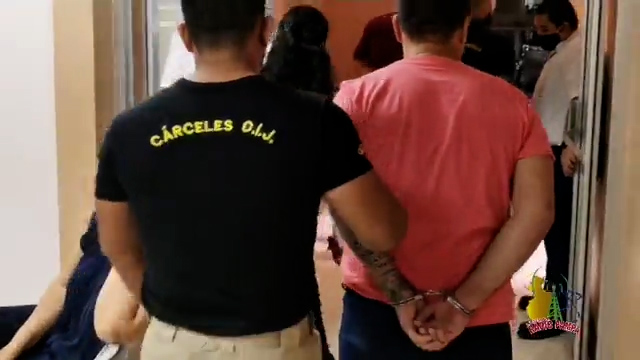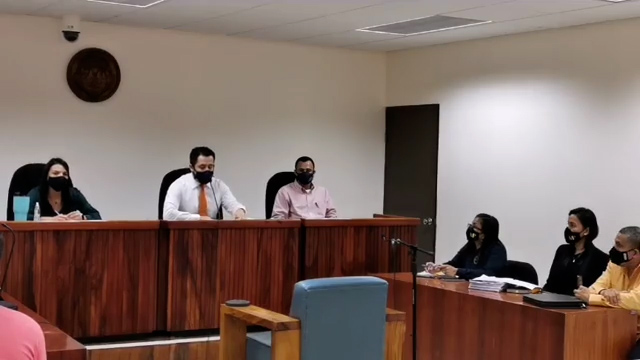
The Criminal Court of Liberia sentenced the man who murdered Mariana Leiva Fernandez, who lived in Liberia, to 38 years in prison, 32 for femicide and six for setting fire to their bedroom, where he killed her.
Just like in the previous trial, Ronaldi Sequeira Duarte and his defense sought to reduce the penalty by arguing that the murder did not constitute gender violence, but rather occurred due to a state of violent emotion in which Sequeira lost control of his actions.
This crime is known as “specially attenuated homicide.” Changing the type of crime would have implied a radical change in justice for Leiva. While femicide is condemned with up to 35 years in prison, attenuated homicide is punishable with a maximum of six years.
However, Judges Yuliana Jimenez, Esteban Lopez and Mario Guido Jimenez justified why Sequeira was tried for femicide and not for attenuated homicide.
“You come from a patriarchal upbringing in which the man is the boss, where the man is the one who dominates, where the man is the one who makes decisions, where the man is the main provider for the household,” said Judge Esteban Lopez.
And you never managed to recognize that this circumstance was the other way around, since Mariana was precisely the one who filled that role in every way,” he added.
The judges threw out the three arguments that Sequeira’s defenders put forth of situations that were “breeding grounds,” as they called it, for him to kill his wife. The accounts given by Ronaldi and his lawyers were fraught with contradictions in this trial and with regards to the strategy of the previous trial.
The Voice compiles and explains the three justifications:
1. It was a heated argument
According to the defense, Sequeira killed his wife because he suffered an emotional outburst on the night of March 5, 2018, when Mariana Leiva confessed that she was unfaithful to him and that she didn’t want to have children with him.
However, the judges indicated contradictions in Sequeira’s statements. They said that they couldn’t be certain that Mariana Leiva had confessed an infidelity to him, but they had evidence that he already knew about Leiva’s alleged infidelity two years earlier, according to statements that he himself made to the psychosocial expert.
“There aren’t any witnesses to these circumstances, Ronaldi. It wasn’t said by any witness on behalf of Mariana’s family. They are things you said yourself,” Judge Lopez pointed out to Sequeira.
There are studies that delve into why infidelity should not be taken into account when analyzing a state of violent emotion. Diana Maffa, an Argentine researcher and director of the Gender Observatory of Buenos Aires, wrote in an academic article that “justifying violent emotion as a reaction to infidelity reproduces ‘gender inequality and ownership over women’s bodies and lives.”
The portrait of a group of friends lacks a loud laugh and a family is missing a member. This was Mariana Leiva, victim of a femicide.
The judges also threw out the argument that his great desire was to have children within the marriage and that Leiva told him that she did not want to. The judges learned that Mariana was pregnant by Ronaldi and that, to the contrary, Ronaldi had a daughter out of wedlock when he was already married to Mariana.
“From your own statements, it can be deduced that this responsibility that you show of having children within the marriage is not credible,” the judge told him and turned the tables on him with an anecdote told by Ronaldi himself about when Mariana called him and told him that she had found out that he had a seven-month-old daughter.
“And it’s when you call and realize that the daughter was already seven months old. This shows, Ronaldi, not an attitude of responsibility as you want to make it seem, but rather manifests an attitude of irresponsibility and it’s not compatible with the fact that you come saying that you always wanted to have a child within marriage.”
2. Violence was bilateral between the couple
The jury concluded that Ronaldi was violent with Mariana Leiva, despite attempts by the killer’s defense team and a hired expert to make it seem that there was bilateral violence.
First, the judges ruled out the expert opinion paid for by the defense because the expert only collected information from Sequeira and his family, and not from a variety of sources without bias. “The report and expert opinion of Mr. Pablo doesn’t meet standards of reliability,” said Judge Lopez.
According to the judges’ analysis, Mariana exercised reactive violence as a result of Ronaldi’s agressions.
The evidence is overwhelming, Ronaldi, in the sense that you were attacking,” Judge Lopez commented. He recalled episodes of violence described during the trial, such as when Mariana fled her home and sought refuge with her sister Andrea.
“This can be seen as part of a cycle of domestic violence where there is dominance by the person who is the aggressor.”
The judges also took into account the statements of the couple’s neighbors, who “indicated that you were the person who initiated those arguments, that you were the person who initiated those expressions of verbal aggression towards Mariana, that you told her that she was worthless, that you told her that she was worth less than dogs.”
In the previous trial, this was also one of the arguments. Ronaldi said that if the neighbors heard him, it was because he has a man’s voice. “Logically, I’m a man and I yell louder,” he said two years ago.

Andrea Leiva, Mariana’s sister, holds the last photo of “La Negrura,” as they called her, the day before her femicide. Photo: Cesar Arroyo.
3. Alcoholism and drug addiction were decisive
The last of Ronaldi’s defense team’s arguments was that he was drunk and high on drugs when he killed his wife.
The judges determined that the evidence allowed them to “clearly rule out that, at the time of the events, he was under the influence of alcohol or of some psychotropic circumstance.”
The panel of judges considered a video in which Ronaldi walks without staggering after killing his wife, the testimony of Mariana’s sister, whom Ronaldi called immediately after killing her, and the testimony of officers from the Liberia police station, where he turned himself in.
Ronaldi even contradicted himself. At times, he argued that when he got home on the afternoon of the femicide, he kept drinking, and another time, he said that he came to feed the dogs and lay down.
He and his defense changed the argument used in the previous trial, when they wanted to blame Mariana for radically changing his life by inducing him to use alcohol and drugs. On this occasion, they admitted that he has had addictions “from an early age.”
Cynthia Castro, a psychologist specializing in gender, had explained to The Voice of Guanacaste that a myth of gender violence is justifying aggression with alcohol problems.

Ronaldi Sequeira Duarte, handcuffed, after hearing his sentence. Photo: Video capture from Radio Pampa.
The Crime and the Sentence
On March 5, 2018, Sequeira cornered Mariana Leiva Fernandez in their bedroom and stabbed her 11 times, including once in the aorta, the main artery that carries blood from the heart to the rest of the body. He then set fire to the bedroom, confessed to the crime and turned himself in to the Liberia police station.
This is the second trial of Mariana Leiva Fernandez’s case. In July 2019, Sequeira was sentenced to 37 years for the same crimes. However, his defense appealed the sentence, the Court of Appeals accepted the appeal and ordered a retrial.
This time, the judges sentenced him to 32 years due to the “atrocity of the crime” (femicide is punishable with up to 35 years).
It is not the same thing, Ronaldi, giving a Christian burial to a person whose face is intact as giving a Christian burial with the face totally disfigured,” Judge Esteban Lopez pointed out.
“The place where this heinous crime took place has also been taken into consideration, Ronald, and it is precisely in the bedroom, in the room that means a refuge.”
The panel of judges considered favoring the social reintegration of the 32-year-old guilty of femicide.
“The court has to take into consideration a principle of balance of guilt… You are still a very young person, with your whole future ahead of you. You are a person with a family, with children,” the judge told him.
“In accordance with the entire policy of social reintegration and social adaptation, you could leave tomorrow, make the decision to change and correct your life,” Judge Lopez told Ronaldi in conclusion.






Comments